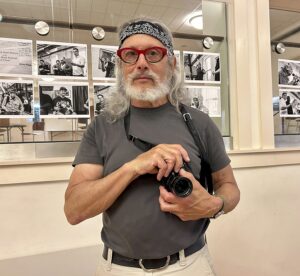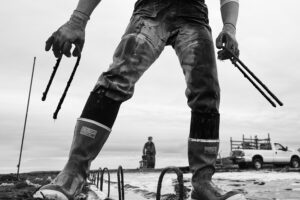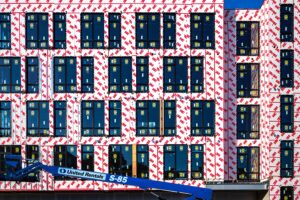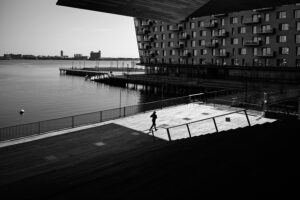At Wellfleet Harbor, Edward Boches wades in shallow water, photographing shellfishermen at low tide. He rides his fold-up bike along Ocean View Drive with a camera around his neck. He’s often at the Outer Cape’s farmers markets, capturing the local community of growers and foragers.

He also roams Boston’s neighborhoods looking for subjects. “Every day, I leave the house with my camera and bicycle,” he says — he lives in Brookline when he’s not at his house in Brewster. If he passes a demonstration, he’s ready with his camera. The same is true on errands. “If I see interesting reflections or scenes at the grocery store, I take photographs,” he says.
Despite starting his career as a news reporter and photographer (he is a frequent contributor to these pages), Boches spent most of his professional life in advertising. After leaving that industry in 2015, he returned to photography in earnest while also working as a professor at Boston University’s College of Communication, where he taught the creative side of advertising and media.
When the pandemic hit, Boches stopped teaching, and his photography practice became a daily activity. “I work on my photographs every day, but I don’t think of it as work,” he says. “I learn more about the world around me and more about myself.”
At the Workspace Gallery in Eastham, Boches is exhibiting three bodies of work, each focused on a place: the shellfishing grants along Indian Neck in Wellfleet; downtown Boston during the pandemic; and Allston, a rapidly gentrifying neighborhood in Boston. The exhibition was curated by gallery owner Bob Korn, who printed the photographs and runs a print studio adjacent to the gallery.
The exhibition reveals Boches’s commitment to his subjects, which he approaches repeatedly over extended periods of time. He takes his viewers along on his journey — as he gets to know a place, so do we.
Wellfleet
Part of knowing a place involves knowing its people. Boches has gotten to know Wellfleet’s shellfishing community, which he has photographed for nearly five years. In “Women on Tide,” his series focusing on women in the industry, he repeatedly visited his subjects while they worked. “I show up a lot, because the first time everybody’s conscious of you being there,” he says. “Going back, you eventually become invisible.”

In one image, Boches photographed Copper Santiago when she was working with a crew on Jim O’Connell’s grant. “When I was photographing Copper, she was staking rebar over a clam bed,” he says. “I was underneath her, but she wasn’t bothered by that, or wasn’t even noticing. She was just doing what she was doing. I didn’t ask her to pose or anything. I just took the photograph.”
Santiago looms above the viewer in an image where she’s cropped at the waist. She seems to be caught in mid-action, swinging forward to plant a mud-covered stake in the ground. Her legs form a triangle, framing a figure in the distance. The black-and-white photograph captures the grit and physical dynamism inherent in this work; a silvery haze of water and sky in the distance provides a poetic reprieve.
Boches says many decisions are made at the editing table. At Workspace Gallery, he’s exhibiting eight prints from this project, culled from over 1,000 shots. “I took probably five or six photographs of Copper from this position,” he says. “This is the one where the composition is most perfect.” It wasn’t until he was editing the photographs that he noticed the figure in the distance, framed by Santiago’s legs. “That’s what made the photograph,” he says.
Allston
In his series “Postcards From Allston,” Boches conveys enthusiasm for the neighborhood’s murals, street art, and creative vibe. Allston is a place where students and immigrants still live. In one photograph, he captures an old-fashioned diner. A pot of daffodils sits on the cement in front of the diner’s glossy red exterior. The diner no longer exists — a sign of Allston’s transformation.

In another photograph, Everett Street, Boches confronts an under-construction multi-story building with rows of gleaming windows. “Any of the places where they’re building a lot of new real estate, whether in Allston or South Boston, the architecture is ugly,” says Boches. “They look like Legos. They’re just square boxes with zero character.”
Despite his distaste for the scene, Boches is able to articulate something visually interesting in this photograph. The gridded structure of the windows and diagonal patterns created by the repeated 3M logos on the surface of the building create an abstract composition where the viewer’s eyes move in all directions. A blue crane in the bottom left corner echoes the blue sky in the top right corner. It’s a dynamic, graphic image.
“It has a sort of symbolism,” says Boches. “This used to be some old brick building. Now, it’s in between what it was and what it will become.”
Boston
The photographs in Boches’s series “Somewhere Along the Curve” are the exhibition’s most somber works. During the 2020 lockdown, Boches cycled around the city photographing the emptiness of normally bustling areas: downtown, the convention center, and in Pandemic Day 39, the Institute of Contemporary Art.

In this image, a lone figure runs through a patch of sunlight on the ICA’s deck over Boston Harbor. There’s a dramatic interplay between light and dark and between the interlocking geometric shapes of water, sky, and architecture. “Some of this visual tension adds an element of the darkness and starkness of Covid,” says Boches.
He created the image after spotting the background composition and then waiting for a figure to enter the scene. “The figure adds a sense of life,” he says.
Although the exhibition is framed as one about place, this “sense of life” is perhaps the most salient throughline in all of his photographs. The runner pushing onward, a creative community fighting for its soul, women working against the tide: they’re all gestures of labor, passion, and resilience.
Inspired by Place
The event: An exhibition of photographs by Edward Boches
The time: Through Jan. 6; artist talk, Saturday, Dec. 7, 3 to 5 p.m.
The place: Workspace Gallery, 3 Main St., Unit 16, Eastham
The cost: Free



